
This man is Stuart Brown. He thinks you should play more.
He has devoted his life and career to researching why "all work and no play make Jack (and Jill) a dull boy (girl)." He's got some serious advice, with brain research, psychological studies, and hard data to back it up.
We've become joyless, wary, and guilt-ridden in the face of our obsession with hard work and problem solving. Without play, we're doomed to stay in the same rut. Play is essential for health and creativity. In fact, it may be the single most significant factor in determining our success and happiness. However, even in the face of overwhelming evidence, people seem reluctant to use this simple process for building a better life: make time for play. To watch Stuart Brown's TED Talk, click here. (Highly recommended!)
For something to qualify as "play," it must be purposeless, all-consuming, and restorative. Some people have forgotten how to play. We operate by the notion that everything must have a serious purpose ("What's this going to do for me? What am I accomplishing?), we are constantly distracted by multi-tasking demands, and we wonder why we're always worn out. We are sleep-deprived (there's another soapbox for another time), and we are even more play-deprived. We're willing to do anything to achieve "peak performance" and positive results. Anything, that is, except the activities that are most effective: rest, and play.
Nothing will inspire a chorus of "Yeah, but. . ."'s quicker than the suggestion that someone take some time out to rest and play. If you see yourself here, it's easy to get back on track. Classes and lessons in the Feldenkrais Method can reconnect you with your lost ability to play. Through the gentle, sometimes whimsical explorations of subtle movements, your mind and body gain refreshed focus, the ability to see fresh perspectives, and the safety to experiment with something new. Moshe Feldenkrais often exhorted his students to "play with this movement," "do this with the greatest ease possible," "do this as if you had the afternoon to waste." To reconnect to your body, your sensations, and your imagination is of vital necessity.
"To everything there is a season, and a time for every purpose under heaven." The wisdom of this ancient scripture advises balance in all things, a yin and yang in a constant and dynamic cycle. Come and play with us!
To find a Feldenkrais practitioner anywhere in the U.S. or Canada, click here.

![Reblog this post [with Zemanta]](http://img.zemanta.com/reblog_e.png?x-id=b4b7785a-3141-49c3-9138-7eb66a2aee3f)


2 comments:
Very interesting that "For something to qualify as "play," it must be purposeless, all-consuming, and restorative." Using this criteria, we don't even use the word correctly. When we "play" sports, it is not purposeless, most of the time the aim is to win, to compete. As observers and/or participants it has become a requirement to hold our interest. When we "play" a musical instrument it is usually to produce a piece of music correctly. No wonder we can't let go and just play, in the language and culture play has been turned into something that sounds like accomplishment.
Indeed, it's an interesting aspect of language. In the case of sports and music, "to play" has much more the connotation of a performance, something that will be judged by others. I've found in working with athletes and musicians (and actors), sometimes they are the ones who have MOST forgotten how to simply play. Learning to "play around" with and at something gives us more resources and depth when it's performance time. Interested to hear what others have observed.
Post a Comment